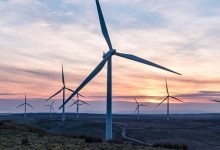Origin Energy says the cost of wind and solar farms has fallen so far it is now cheaper than the marginal cost of coal generation, and the company is moving on from the concept of “24/7 base-load”.
The assessment was made by Greg Jarvis, the company’s head of energy trading and operations, in an interview for RenewEconomy’s popular Energy Insiders podcast, published on Tuesday.
“I have been in this game for so long … the one thing I have seen is just the cost of renewables really change the game,” Jarvis says. “It is amazing what we have been seeing.
“Renewables are cheaper than the marginal cost of black coal at the moment. They are very cheap.”
Jarvis puts the cost of solar in the mid $40s/MWh and the cost of wind at the low $50s/MWh. That cost of solar is around half the average price of wholesale electricity in most states this year.
The assessment accords with other views in the market about the cost of wind and solar, including from UK billionaire Sanjeev Gupta, who is looking at solar to underpin the expansion of his newly bought steel business in Australia.
However, it should be noted that such numbers have yet to be seen in power purchase agreements – apart from Origin’s deal with the Stockyard Hill wind farm – largely because they are hidden, but also because the developers need to make a margin of profit.
And costs are being blurred and added to by increased requirements for connection agreements.
Still, with China now mulling a dramatic lift in its 2030 renewable energy target to 35 per cent from 20 per cent, the chances are that the costs of both wind and solar will fall dramatically again.
And with the falling cost of storage – this is likely to enable “firm” renewables to emerge as a serious contender to existing fossil fuel plants.
Jarvis also made it clear that Origin Energy has moved on from thinking about new generation in terms of “base-load”, which stands in sharp contrast to current government thinking and the conservative commentariat.
Asked if Origin Energy had moved beyond the idea – promoted by the federal government and many in mainstream media – that reliability depended on 24/7 base-load power, Jarvis said:
“Oh, a Long time ago. The idea of base-load power stations is well and truly gone.”
He cited Origin’s recent investment in its last coal fire generator Eraring, and its efforts to make it more flexible so it can power down in the middle of the day so Origin can focus on cheap renewables, before turning up the power at peak times.
Origin’s position in the market is in stark contrast to AGL, which remains the largest generator of coal power, and hopes to keep its Loy Yang A brown coal power plant going until 2048, even if it plans to close the ageing and decrepit Liddell plant by 2022.
Origin plans to close Eraring, by 2032. In the meantime, it is turning to wind and solar, and battery and pumped hydro storage investments.
The first of these new investments is a large scale battery at the Mt Stuart peaking plant, which burns jet fuel at times of high demand or for grid security issues such as an approaching cyclone, will test its fast response and “black-start” capabilities.
The second, a potential expansion of the Shoalhaven pumped hydro facility, is also under consideration, and Jarvis says more storage investments are inevitable.
In South Australia, Origin is also looking to replacing units at its Quarantine gas fired power station with fast-start “aero-derivative” plant that can combine well with battery storage.
And it is looking at opportunities in its “brown field” sites, including Eraring, where it sees big opportunities for a change of technology, just as AGL is planning at Liddell.
“We see a combination of fast gas, pumped hydro and battery storage, and combination of those with renewables is the future,” Jarvis says.
“And let’s not forget what’s behind the meter, and how do you aggregate those resources,” he said, noting that Origin was now the biggest installer of rooftop solar in the country, and was also heavily involved in household battery storage.






